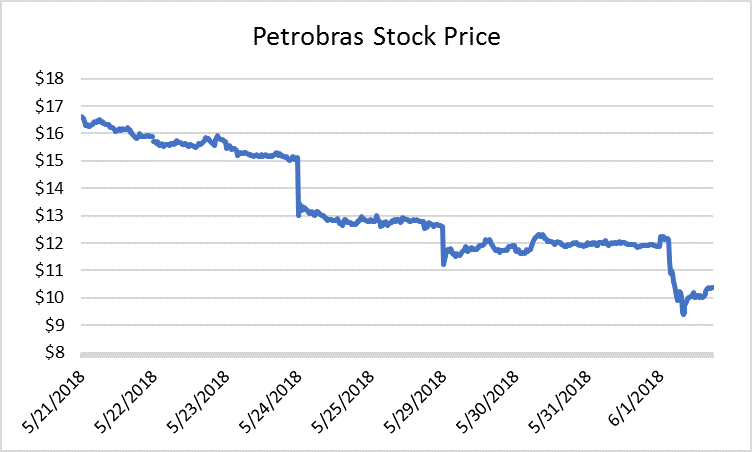Truck drivers, oil workers strike in Brazil; Petrobras CEO resigns
Brazil’s national oil company Petrobras (ticker: PBR) has experienced significant turmoil over the past two weeks, as multiple labor actions affected operations.
The roots of Petrobras’ current difficulties lie in its fuels policy, which shifted in 2016. Historically, the price of gasoline and diesel in Brazil has been subsidized and divorced from international rates. This policy, naturally, was onerous for Petrobras and the government, as fuel was often sold below cost.
In late 2016, however, the policy changed, allowing Brazil’s NOC to set prices based on market forces. This was a boon to Petrobras, and also allowed the federal government to collect additional revenue in taxes, but the rise in oil prices over the past two years translated through to the pump.
Truck drivers’ strike caused major disruptions
This led to significant popular opposition to the policy, which boiled over in May. Truck drivers throughout the country went on strike, which caused major disruption in many industries. The strike, which would eventually stretch for 11 days, forced factories and farms to shut down, and many industries have already reported losses.
Two days after the strike began, Petrobras announced it would cut diesel prices by 10% for 15 days, in an effort to resolve the action. While this move was not presented as a government order, the threat of the government interfering led to a large drop in Petrobras’ share price.
On Sunday the government reached a deal with the striking truck drivers, cutting taxes on diesel, freezing the price for 60 days, and allowing a change in the fuel’s price only once each month. While the Brazilian government said it will compensate Petrobras for the policy, investors did not take the news well.
Government interference in pricing of a company’s product is a bad thing for investors on principle, particularly in the case of Petrobras, where investors are already wary of interference. Shares of the company fell sharply after the new policy was announced.
Petrobras workers strike brings seven rigs offline
The truck driver’s strike was not the only labor action that disrupted the NOC’s operations, however, as a strike among its own workers also took place last week. Workers on rigs and refineries held a three-day strike, shutting down operations at several locations.
Employees on at least 25 oil rigs in the major Campos basin ceased work, and seven rigs shut down entirely. In an unusual twist, however, the trucker’s strike helped mitigate the effect of the oil worker’s strike. Petrobras accumulated a large stock of refined products during the strike, as shipping slowed to a crawl. This inventory means the company was able to ride out the oil worker’s strike with minimal disruptions.
Petrobras CEO resigns – stock down 36% since strike began
While both strikes have now ended, their effects continued, as Petrobras CEO Pedro Parente resigned today.
Parente’s resignation is a major blow to Petrobras, as he was credited with turning around the company and reducing corruption and mismanagement. Investors viewed Parente favorably as he vowed to shift company strategy away from government dictates into a market-oriented structure.
Markets dropped sharply on the news, with the stock falling by 22% in intraday trading. The two strikes have dealt a heavy blow to Petrobras’ share price, which has fallen by almost 36% since the trucker’s strike began.


